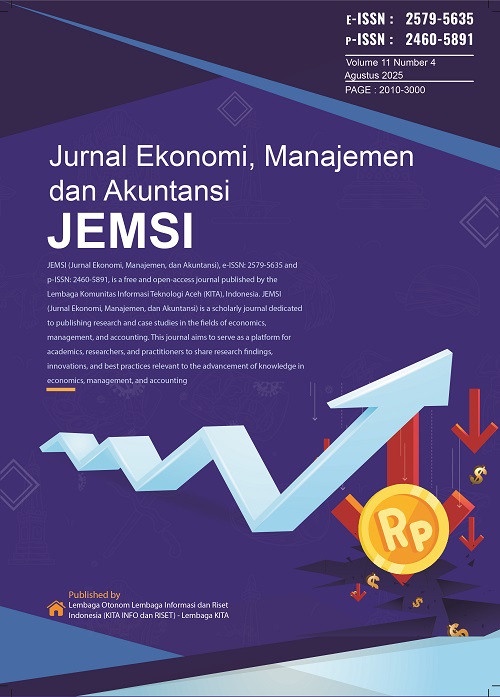Pengaruh Gaya Kepemimpinan Demokratis Terhadap Kinerja Pegawai Pada Kantor Badan Pendapatan Daerah Kabupaten Luwu Utara
DOI:
https://doi.org/10.35870/jemsi.v11i4.4340Keywords:
Leadership, Democratic, PerformanceAbstract
The Influence of Democratic Leadership Style on Employee Performance at the Regional Revenue Agency Office of North Luwu Regency" Thesis, Management Study Program, Faculty of Economics and Business, Muhammadiyah University of Palopo. This study aims to determine the democratic leadership style, employee performance, and the influence of democratic leadership style on employee performance at the Regional Revenue Agency Office of North Luwu Regency. This study is a quantitative study that shows a causal relationship. The population in this study was 55 respondents. Data collection techniques used were observation, questionnaires, interviews, and documentation. The data analysis technique used was descriptive statistical analysis using percentages and for inferential statistical analysis using data normality tests, product moment correlation analysis, and simple linear regression analysis. The results of the study indicate that the democratic leadership style at the Regional Revenue Agency Office of North Luwu Regency is in the good category in terms of indicators of decisions made together, respecting the potential of subordinates, listening to criticism, suggestions, and opinions from subordinates and cooperating with subordinates. Employee performance at the Regional Revenue Agency Office of North Luwu Regency is in the high category in terms of indicators of Participatory, Decision Making, Quality of work, Quantity of work, Attitude, Cooperation, Communication. Based on the product moment correlation analysis, it is stated that there is a relationship between the influence of Democratic Leadership Style on Employee Performance at the Regional Revenue Agency Office of North Luwu Regency which is in the low category. The results of the simple regression analysis show that there is a positive influence of democratic leadership style on Employee Performance at the Regional Revenue Agency Office of North Luwu Regency.
Downloads
References
Ariani, N. (2015). Pengaruh gaya kepemimpinan demokratis terhadap disiplin kerja karyawan pada PT. PP. London Sumatera Indonesia, Tbk. Wilayah Bulukumba. Skripsi Administrasi Perkantoran FIS UNM.
Busro, M. (2018). Teori-teori manajemen sumber daya manusia. Jakarta: Prenadameidia Group.
Djunaedi, R. N., & Gunawan, L. (2020). Pengaruh gaya kepemimpinan demokratis terhadap kinerja karyawan. Jurnal Manajemen, 5(2), 45-59.
Gunawan, L., & Muh Nur. (n.d.). Pengaruh gaya kepemimpinan demokratis, lingkungan kerja terhadap kinerja pegawai.
Kartono, K. (2013). Pemimpin dan kepemimpinan: Apakah kepemimpinan abnormal itu? Edisi pertama. Jakarta: PT. Rajawali.
Mustafa, P., Anwar, S. M., & Tahier, I. (2021). Pengaruh gaya kepemimpinan melayani, lingkungan kerja, teknologi informasi dan disiplin kerja terhadap kinerja pegawai Badan Pendapatan Daerah Kota Palopo. Jurnal Manajemen dan Bisnis, 8(3), 120-135.
Rivai, V. (2014). Manajemen sumber daya manusia untuk perusahaan (Edisi ke-6). Depok: PT. Raja Grafindo Persada.
Robbins, S. P. (2016). Perilaku organisasi. Jakarta Selatan: Saemba Empat.
Robbins, S. P., & Judge, T. A. (2013). Organizational behavior (15th ed.). New Jersey: Pearson Education.
Sondang, P. S. (2014). Teori administrasi publik. Bandung: Alfabeta.
Sugiyono. (2017). Metode penelitian kuantitatif, kualitatif, dan R&D. Bandung: Alfabeta, CV.
Sugiyono. (2018). Metode penelitian kombinasi (Mixed Methods). Bandung: CV Alfabeta.
Sutrisno, E. (2020). Manajemen sumber daya manusia. Jakarta: Kencana.
Tamrin. (2018). Pengaruh disiplin kerja dan gaya kepemimpinan terhadap produktivitas kerja konveksi Famili Jaya Bobotsari Purbalingga Jawa Tengah. Jurnal Manajemen, 7(4), 112-126.
Wahjosumidjo. (2013). Kepemimpinan kepala sekolah, tinjauan teoritik dan permasalahannya. Jakarta: PT. Radja Grafindo Persada.
Wijono, S. (2018). Psikologi industri dan organisasi. Jakarta: Prenada Media.
Downloads
Published
Issue
Section
License
Copyright (c) 2025 Ananda Zhalzhabilah H, Ilham Tahier, Ibrahim Halim

This work is licensed under a Creative Commons Attribution 4.0 International License.
Copyright and Licensing Agreement
Authors who publish with this journal agree to the following terms:
1. Copyright Retention and Open Access License
- Authors retain full copyright of their work
- Authors grant the journal right of first publication under the Creative Commons Attribution 4.0 International License (CC BY 4.0)
- This license allows unrestricted use, distribution, and reproduction in any medium, provided the original work is properly cited
2. Rights Granted Under CC BY 4.0
Under this license, readers are free to:
- Share — copy and redistribute the material in any medium or format
- Adapt — remix, transform, and build upon the material for any purpose, including commercial use
- No additional restrictions — the licensor cannot revoke these freedoms as long as license terms are followed
3. Attribution Requirements
All uses must include:
- Proper citation of the original work
- Link to the Creative Commons license
- Indication if changes were made to the original work
- No suggestion that the licensor endorses the user or their use
4. Additional Distribution Rights
Authors may:
- Deposit the published version in institutional repositories
- Share through academic social networks
- Include in books, monographs, or other publications
- Post on personal or institutional websites
Requirement: All additional distributions must maintain the CC BY 4.0 license and proper attribution.
5. Self-Archiving and Pre-Print Sharing
Authors are encouraged to:
- Share pre-prints and post-prints online
- Deposit in subject-specific repositories (e.g., arXiv, bioRxiv)
- Engage in scholarly communication throughout the publication process
6. Open Access Commitment
This journal provides immediate open access to all content, supporting the global exchange of knowledge without financial, legal, or technical barriers.











